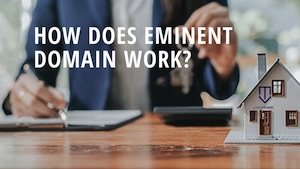
For many of us, real estate is our most valuable asset and the thing that we rely on to provide security for retirement. It is also our passion where we can use our creativity to make our mark on the world. When we receive notice that it may be the subject of an eminent domain action, however, the unknown elements of the process can be a source of great anxiety.
This article provides insight into how the eminent domain process works so that you can know what to expect and hopefully navigate the process more smoothly. The typical steps for the eminent domain process are laid out below.
The Eminent Domain Steps
The first step in the eminent domain process is that a governmental entity creates a plan for a public project, such as a road or drainage system, in response to a problem or perceived need. For example, the government may decide that congestion on the freeway means that they should add more lanes or that a nearby development will cause flooding problems in other areas.
Second, once the plan is completed, the entity conducts an environmental review and identifies properties that they believe will be necessary for the project. In fact, the law requires that the government take only “necessary” property in order to complete the project. Nevertheless, the government frequently overestimates what is “required,” which can lead to taking much more than should be necessary under a common-sense approach to the project.
Third, following the environmental review, the government will hold a hearing to formally determine the “necessity” of the taking. During this hearing, the property owner has an opportunity to object and can state their concerns on the record.
Fourth, the government conducts an appraisal of the property, typically through a third-party firm. As many of us who have gone through the appraisal process for our homes know, however, the process usually results in a “range” of value, and the governmental appraisal firm frequently tends to find that private property falls only on the “lower” range.
Fifth, the government will send out real property negotiators to the affected property owners who are skilled in securing property for the least amount of money.
Sixth, if these trained negotiators are unable to convince the property owner to take a lowball offer, then the government typically begins using lawyers to scare the property owner with the threat of a lawsuit.
Seventh, if the property owners are still unwilling to take a low value for their property after this entire process, the government will deposit “probable compensation” and begin the formal eminent domain process through the filing of a lawsuit.
Eighth, throughout the eminent domain process, the government and the property owner will conduct discovery on the property’s “fair market value,” typically through the use of various experts with competing opinions.
Ninth, the government and the property owner will attend a settlement conference where there will be one last formal opportunity to negotiate in advance of trial.
Lastly, if the parties are unable to reach a negotiated settlement, the matter goes to court, where a jury of your peers can decide whether the government has offered sufficient value to the property.
Go here to get more details.
 California Partition Law Blog
California Partition Law Blog

